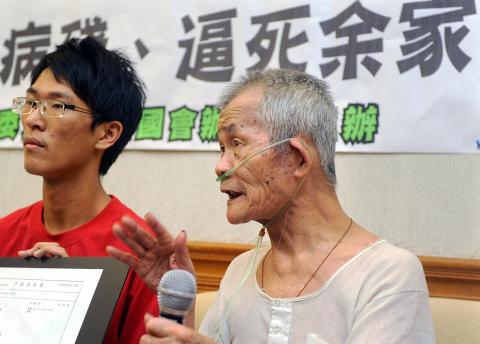A 73-year-old on a ventilator yesterday called on President Ma Ying-jeou (馬英九) to provide new housing before next month, when homes in Huaguang Community (華光社區) are scheduled to be dismantled.
“There is not much I ask the government to do, only that it helps resolve our relocation problem and abrogates the fines,” Yu Ssu-chin (余賜秦) told a press conference in Taipei organized by Democratic Progressive Party Legislator Tien Chiu-chin (田秋堇).
A monthly wage of little more than NT$30,000 from his youngest son is the main source of income Yu’s family of five relies on, said a student surnamed Tung (董) who, with other students, has sided with the residents to preserve their houses.

Photo: Liao Chen-huei, Taipei Times
Tung said the residents recently received a letter from the Ministry of Justice, which owns the land, reminding them demolition is set to begin at the end of next month, but most of them have nowhere to go.
Located near Taipei’s National Chiang Kai-shek Memorial Hall, the Huaguang Community has been designated by the Executive Yuan as the site for a commercial zone.
The community was originally a neighborhood of 183 households, but earlier this year, part of the neighborhood was flattened despite opposition from residents.
Yu said the house he has lived in for more than 30 years was bought from a friend and the transaction was completed after filing for registration at the Daan District Office.
“Although I did not own the land, the house was mine,” Yu said.
Therefore, Yu said he does not understand why he was found by the ministry to be illegally profiting from occupying the land.
After the ministry won a lawsuit, the court ordered forfeiture of one-third of his youngest son’s salary to pay legal costs of NT$130,000.
In addition to a fine of NT$2 million (US$66,862), Yu must pay NT$110,000 for the dismantling of his house if he fails to demolish it by the deadline.
“I cannot afford all these fines. I cannot afford to live in public housing either because I have to pay a deposit of NT$50,000 before we move in, monthly rent of NT$10,000, management costs of NT$1,000 and a parking fee of NT$2,000 per month,” Yu said.
The ministry has arranged for Huaguang residents to live in public housings, but many of them have found the accommodation unaffordable or unsuitable, Tung said.
“We urge the Ministry of Justice to call off its demolition plans until it provides relocation assistance for the displaced people that meets their specific needs,” Tung said, joined by dozens of students at the press conference.
John Liu (劉可強), professor and executive director of the Building and Planning Research Foundation at National Taiwan University, slammed the government for “a gross violation of the Constitution” over the salary forfeiture and over the forced evictions without adequate alternative housing as required by international human rights standards under the two human rights covenants the nation has signed.
Tien said Ma should step in to settle the problem because he had repeatedly promised the residents when he was mayor of Taipei that their houses would not be flattened before they have adequate places to live in.

Nipah virus infection is to be officially listed as a category 5 notifiable infectious disease in Taiwan in March, while clinical treatment guidelines are being formulated, the Centers for Disease Control (CDC) said yesterday. With Nipah infections being reported in other countries and considering its relatively high fatality rate, the centers on Jan. 16 announced that it would be listed as a notifiable infectious disease to bolster the nation’s systematic early warning system and increase public awareness, the CDC said. Bangladesh reported four fatal cases last year in separate districts, with three linked to raw date palm sap consumption, CDC Epidemic Intelligence

Two Taiwanese prosecutors were questioned by Chinese security personnel at their hotel during a trip to China’s Henan Province this month, the Mainland Affairs Council (MAC) said yesterday. The officers had personal information on the prosecutors, including “when they were assigned to their posts, their work locations and job titles,” MAC Deputy Minister and spokesman Liang Wen-chieh (梁文傑) said. On top of asking about their agencies and positions, the officers also questioned the prosecutors about the Cross-Strait Joint Crime-Fighting and Judicial Mutual Assistance Agreement, a pact that serves as the framework for Taiwan-China cooperation on combating crime and providing judicial assistance, Liang

Reports of Taiwanese going missing, being detained or interrogated, or having their personal liberties restricted in China increased about fourfold annually last year, the Mainland Affairs Council (MAC) said yesterday. Last year, 221 Taiwanese who traveled to China were reported missing, were detained and interrogated, or otherwise had their personal freedom restricted, up from 55 the previous year, the council said. Reopening group tours to China would be risky, as it would leave travelers with no way to seek help through official channels after Beijing shut down dialogue between the associations tasked with handling cross-strait tourism, the MAC said. Taipei’s Taiwan Strait Tourism

The manufacture of the remaining 28 M1A2T Abrams tanks Taiwan purchased from the US has recently been completed, and they are expected to be delivered within the next one to two months, a source said yesterday. The Ministry of National Defense is arranging cargo ships to transport the tanks to Taiwan as soon as possible, said the source, who is familiar with the matter. The estimated arrival time ranges from late this month to early next month, the source said. The 28 Abrams tanks make up the third and final batch of a total of 108 tanks, valued at about NT$40.5 billion